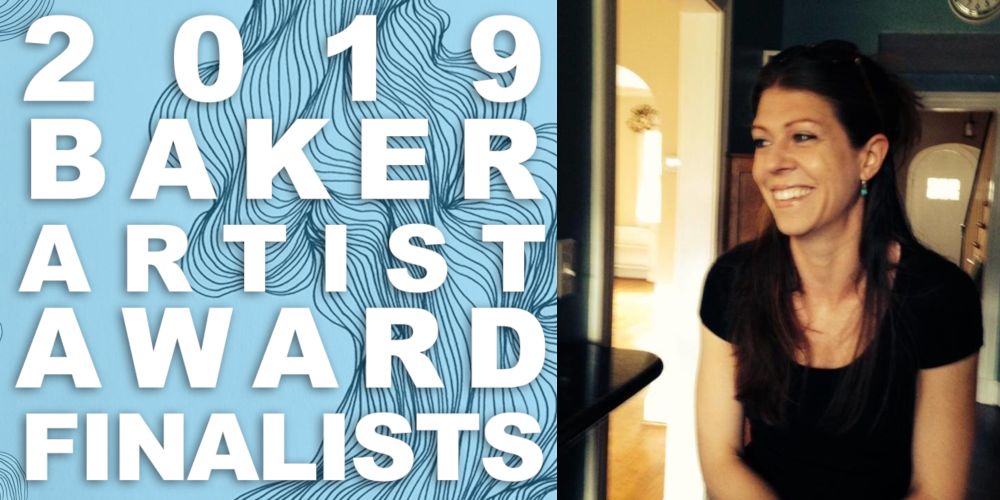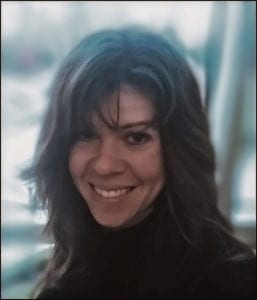An Interview with Elizabeth Hazen, Baltimore Poet and 2019 Baker Award Finalist
"Baltimore is a small city; it is almost impossible to leave the house without running into someone you know. Until I moved here, I never experienced a strong connection to a place, but after almost 20 years here, I feel Baltimore, with all of its quirk and contradiction, is part of my identity."

Baltimore poet, Elizabeth Hazen's first collection of poems is entitled Chaos Theories. Last week the young poet was announced as a finalists for the prestigious Baker Artist Award in literature. We sat down to talk with her about her experience in Baltimore as an artist and what programs like The Baker Awards mean to artists.
ASP: When did you find out you were a finalist for the 2019 Baker Awards?
Elizabeth Hazen: I received an email on Tuesday afternoon [2/19].
ASP: What is it like being an artist in Baltimore, specifically a poet?
EH: I love living and working in Baltimore. There is a great community of talented, supportive writers and artists who tend to be very down-to-earth and inspiring in their work and attitudes. I am very fortunate to have an amazing group of friends here who are writers, and we are able to help each other through times of disappointment and rejection, encourage one another to keep at it, and celebrate together when there is good news.
ASP: What about the city inspires you?
EH: Baltimore is a small city; it is almost impossible to leave the house without running into someone you know. Until I moved here, I never experienced a strong connection to a place, but after almost 20 years here, I feel Baltimore, with all of its quirk and contradiction, is part of my identity. There is a scene in John Waters’ movie Pecker in which Christina Ricci, whose character is a native Baltimorean, returns from a trip to New York and kisses the sidewalk in relief as soon as she steps off the bus. That’s kind of how I feel whenever I come back from a trip. This can be a hard place to live – one bursting with violence and conflict and inequity – but also one that is rife with creativity and drive and promise. I feel fortunate to be a part of that energy.
ASP: Can you talk about the challenges for a poet financially and the importance of programs like the Baker Awards?
EH: For most poets I know, financial support – through prizes or grants – means buying time to write; for me it means not having to work additional jobs over the summer (I am a teacher) or having to take on tutoring or other work during the school year. This frees up precious time in my office. Beyond the practical benefits, though, I think any recognition, particularly something that comes with tangible rewards, is a great motivating force. Writers deal with so much rejection and disappointment, that the validation that comes with a prize like the Baker is a huge psychological boon.
ASP: What is it like having an artistic career while being a full-time educator especially as you gain more exposure for your art?
EH: While my writing and teaching have always been separate (many students don’t even know I am a poet), I do feel that each benefits from the other. Balancing these two endeavors can be a challenge, though, and there are times during the school year when I hardly write at all. Carving out time is a constant effort, but the exposure and recognition just makes me more motivated to find a way to keep writing.
ASP: What are you working on now?
EH: I am in the process of revising and finalizing my next collection, Girls Like You, due out in January 2020.
 Elizabeth Hazen is a poet and essayist whose work has appeared in Best American Poetry 2013, Southwest Review, The Threepenny Review, The Normal School, and other journals. She earned her bachelor’s degree from Yale and her master’s from The Writing Seminars at Johns Hopkins. She teaches English at Calvert School in Baltimore, Maryland. Chaos Theories is her first book.
Elizabeth Hazen is a poet and essayist whose work has appeared in Best American Poetry 2013, Southwest Review, The Threepenny Review, The Normal School, and other journals. She earned her bachelor’s degree from Yale and her master’s from The Writing Seminars at Johns Hopkins. She teaches English at Calvert School in Baltimore, Maryland. Chaos Theories is her first book.
More from Elizabeth Hazen
Featured Audio: “Maxwell’s Demon,” a poem by Elizabeth Hazen
Elizabeth Hazen Reads “Maxwell’s Demon” Hazen has a way of uncovering universal feelings that resonate, even if we haven’t experienced her particular grief or confusion. Gabriella Souza “By dint of […]
[Elizabeth Hazen] Lessons From a Turtle (Fishbowl)
Lessons From a Turtle by Elizabeth Hazen Once at the National Zoo, I watched a pair of giant tortoises copulating, the sound that emanated from their habitat like a sleeper’s […]
Waiting for Maxwell’s Demon
Waiting for Maxwell’s Demon by Elizabeth Hazen My father is a geophysicist. As a child, I spent many hours on road trips to remote quarries where we would hike to […]
- « Previous
- 1
- 2
- 3
